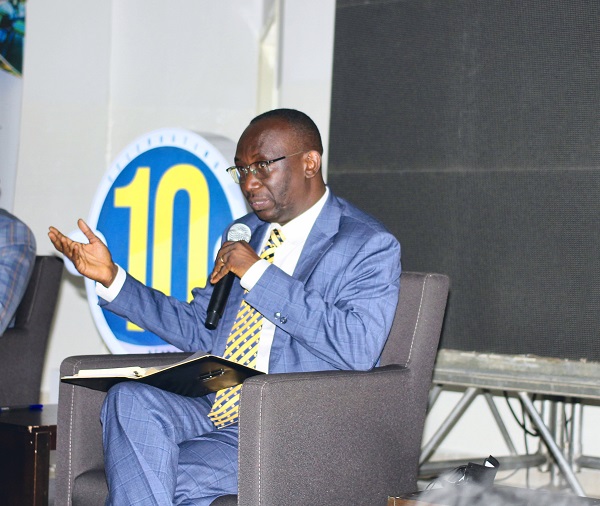
GNPC needs well-defined mandate - Baah-Nuakoh
THE General Manager, Sustainability and Stakeholder Relations at the Ghana National Petroleum Corporation (GNPC), Dr Kwame Baah-Nuako, has called for a firm national decision on what the real mandate of the national oil company, Ghana National Petroleum Corporation (GNPC) should be.
He said GNPC was not a private limited company but 100 per cent state-owned, with the state’s interest determined at any point by the government of the day.
He said that most of the issues or operations of GNPC were couched in law, including the fact that government agencies such as the Bank of Ghana (BoG) and the Ministry of Finance as the institutions that decide the release of the revenue that goes to the corporation.
“Its policy direction and the ventures that it can undertake are determined by politicians because GNPC’s annual work programme has to go to Parliament and it is only the House that approves whether GNPC can spend certain monies or not.
So, if we put all these things into law, I am wondering how we are insulating GNPC from political interference when the Minister of Energy is the one who determines the policy direction,” he said during a panel discussion at the 10th anniversary public lecture of the Public Interest and Accountability Committee (PIAC) in Accra.
It was on the theme, “10 years of the management and use of petroleum revenues in Ghana: The way forward.”
Dr Baah-Nuako said if a company and its shareholder, the state, at any point in time can issue policy directions outside an annual general meeting, “I am wondering how, as academic, we could have a checkered GNPC from interference because everything has been prescribed by law.”
GNPC political economy analysis
On March 3, 2022, the PIAC launched a report on “Assessment of the Management and Use of Ghana’s Petroleum Revenues, (2011-2020)” in Accra.
It, among other things, measured the impact of oil revenues accruing to the country within the period under review and on the socio-economy and the real sectors of the economy.
The report touched on the political economic factors that drive GNPC’s operations.
Indeed, it said that GNPC also operates as a statist bureaucracy by contributing to the development of oil and gas assets, while delivering revenues and patronage for the state and the elites.
Reacting to that aspect of the report, Dr Baah-Nuako cautioned that such phrases increase the commercial risk of the GNPC immediately it goes onto the market.
“The people who do the plus analysis quote these documents as the source formation. If you put GNPC in such categorisation, if I am an international investor, if I am a financier, why will I be dealing with the GNPC?
“There are so many models that you could use but the report decided to box GNPC in a way, stating that it delivers revenue and patronage to state and elites. I think it is nether helpful nor useful,” he said.
“I think we don’t necessarily have to place our national oil company on anybody’s model because such reports are used by international finance institutions for reference. It is a very useful exercise and GNPC supports it but we should be careful when we say we are documenting after 10 years,” he said.
Need for framework
An Energy Economist and Political Risk Analyst, Dr Theophilus Acheampong, called for clear understanding of where the GNPC is coming from and where it is going.
“If we want to improve the corporate governance going forward, then there is the need to address or insulate some of these appointment powers,” he said.
Some highlights of the report
The report revealed that the Annual Budget Funding Amount (ABFA) was allocated the highest amount of $2.6 billion (40 per cent) out of the $6.55 billion in total petroleum receipts earned between 2011 and 2020.
This is followed by the Ghana National Petroleum Cooperation (GNPC), which has so far received $2.0 billion (30 per cent); the Ghana Stabilisation Fund (GSF), $1.39 billion (21 per cent); whereas the Ghana Heritage Fund (GHF) has received $586 million (9%) of the total amount.
Among other things, the report measured the impact of petroleum revenues on socio-economy and the real sectors of the economy.
It said the ABFA had been a critical financing source for the national budget.
“Nevertheless, while total benchmark revenue allocations to ABFA amounted to GH¢9.41 billion ($2.61 billion), allocations amounted to GH¢8.51 billion ($2.28 billion), with the balance swept into the Consolidated Fund under the government’s Treasury Single Account (TSA) policy,” it said.